machine screw size guide
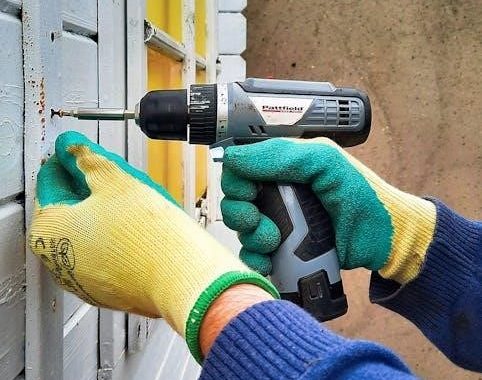
machine screw size guide
Machine screws are essential fasteners used in various engineering applications, offering precise connections. Their sizes, defined by diameter, thread pitch, and length, ensure compatibility and structural integrity across industries.
1.1 Definition and Purpose of Machine Screws
Machine screws are threaded fasteners designed to assemble and secure parts in machinery and equipment. Unlike traditional screws, they typically require a nut or tapped hole for tightening. Their standardized sizes ensure compatibility across various applications. These screws are crucial for creating secure, precise connections, often used in automotive, aerospace, and electronics. Made from materials like steel or stainless steel, they offer durability and reliability, making them indispensable in modern engineering for both structural and functional purposes.
1.2 Brief History of Machine Screw Development
Machine screws trace their origins to early screw-cutting techniques in the 18th century, evolving from simple handcrafted designs to standardized fasteners. The Industrial Revolution spurred advancements, introducing precision manufacturing and interchangeable parts. Standardization efforts in the 20th century led to uniform sizes and thread patterns, ensuring compatibility across industries. Today, machine screws are a cornerstone of modern engineering, with continuous innovation in materials and coatings to meet demanding applications.
1.3 Importance of Machine Screws in Modern Engineering
Machine screws are indispensable in modern engineering, providing structural integrity and precise connections across industries. Their standardized sizes and thread patterns ensure reliability and compatibility, crucial for safety and efficiency. From automotive to aerospace, these fasteners withstand rigorous conditions, enabling complex systems to function seamlessly. Their versatility and strength make them a fundamental component in maintaining and advancing technological infrastructure, ensuring durability and performance in diverse applications.
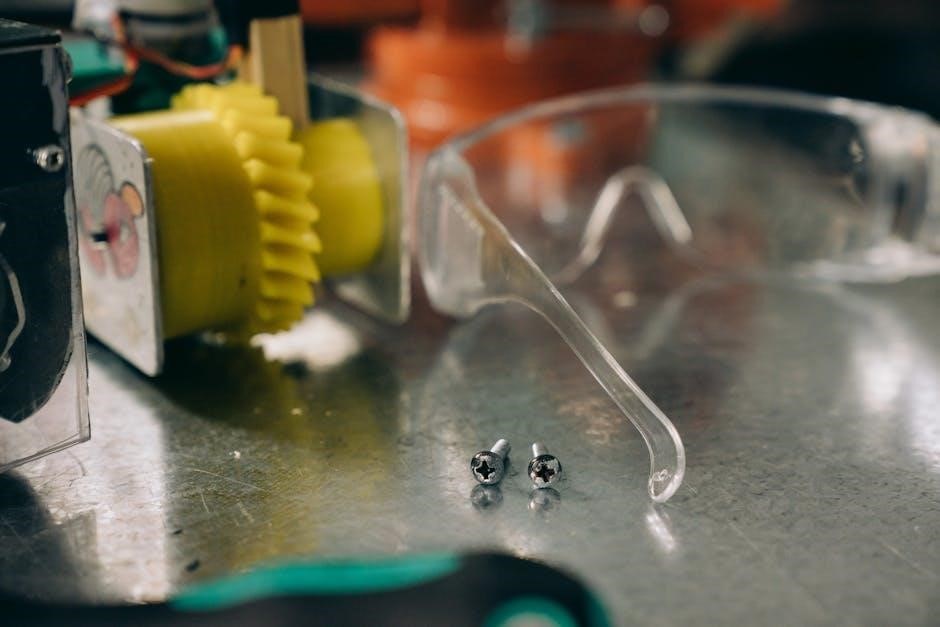
Understanding Machine Screw Measurements
Machine screw measurements are critical for ensuring proper fit and function. They include diameter, thread pitch, length, and threads per inch (TPI), each vital for precise applications.
2.1 Diameter and Thread Pitch Explained
The diameter of a machine screw refers to the screw’s width, measured across the threads. The thread pitch is the distance between consecutive threads. Together, these measurements ensure compatibility with mating parts. Diameter is typically measured in inches or millimeters, while thread pitch is specified in threads per inch (TPI) for imperial systems or millimeters for metric systems. Accurate measurement of these dimensions is crucial for selecting the correct screw size, ensuring proper fitment and functionality in various applications.
2.2 Screw Length: How It’s Measured and Its Significance
Screw length is measured from the tip to the base of the head, excluding the thread. It is crucial for ensuring proper fitment and load distribution. The length determines how deeply the screw sits in the material, affecting structural integrity and stability. Proper measurement ensures the screw does not protrude excessively or sink too deeply, which could compromise the application. Accurate screw length measurement is vital for achieving reliable connections in engineering and construction projects.
2.3 Thread Count and TPI (Threads Per Inch)
Thread count, measured in threads per inch (TPI), determines a screw’s compatibility with threaded holes. Higher TPI indicates finer threads, while lower TPI means coarser threads. TPI is crucial for ensuring proper fitment and load distribution. For metric screws, thread pitch is measured in millimeters, but TPI is used for imperial measurements. The thread count affects the screw’s strength and resistance to stripping. Coarser threads are easier to engage but offer less precision, while finer threads provide a tighter fit. Accurate TPI measurement ensures optimal performance in engineering applications.
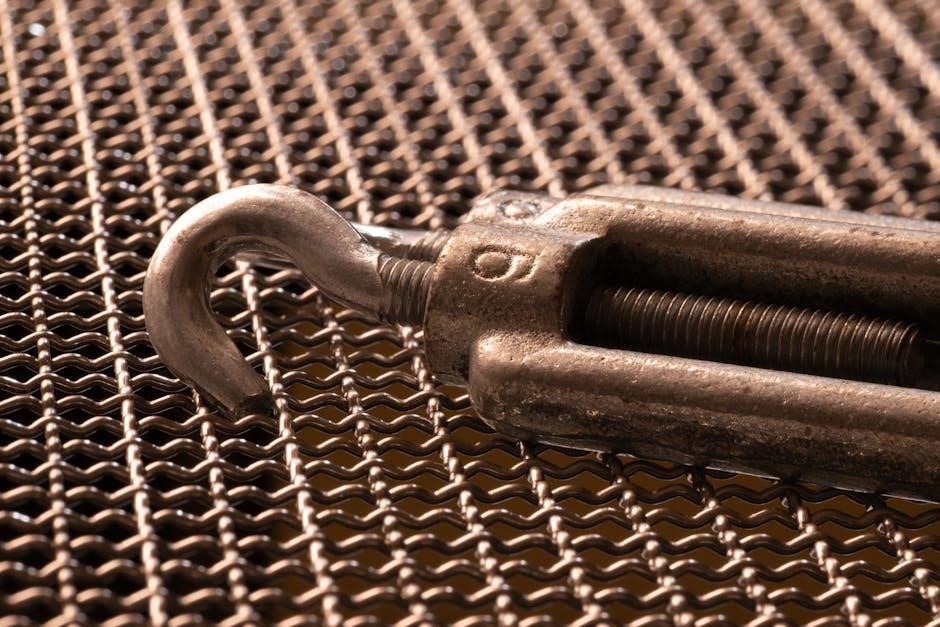
Common Machine Screw Materials and Finishes
Machine screws are made from materials like steel, stainless steel, brass, and aluminum, each offering unique strength and corrosion resistance. Finishes like zinc or chrome enhance durability and aesthetics.
3.1 Steel: The Most Common Material for Machine Screws
Steel is the most widely used material for machine screws due to its high strength, durability, and cost-effectiveness. It is often heat-treated to enhance hardness and resistance to wear. Steel screws are available in various grades, including carbon steel and alloy steel, each suited for different load-bearing applications. Their versatility makes them ideal for machinery, automotive, and construction industries. However, steel screws may require coatings like zinc or chrome to prevent corrosion, ensuring longevity in harsh environments. Despite their popularity, steel screws can be heavy and may rust if not properly finished.
3.2 Stainless Steel: Corrosion-Resistant Options
Stainless steel machine screws are highly prized for their exceptional corrosion resistance, making them ideal for harsh environments. Containing a minimum of 10.5% chromium, they form a protective oxide layer that resists rust and degradation. Commonly used in marine, medical, and food processing applications, stainless steel screws offer durability and hygiene. Grades like 304 and 316 provide varying levels of resistance to chemicals and saltwater. While more expensive than carbon steel, their longevity and low maintenance requirements make them a cost-effective choice for critical applications requiring reliability and strength.
3.3 Brass and Aluminum: Specialized Applications
Brass and aluminum machine screws are chosen for specific properties. Brass screws offer excellent conductivity and corrosion resistance, ideal for electrical applications. Aluminum screws are lightweight and corrosion-resistant, commonly used in aerospace and automotive industries. Both materials are suitable for environments where weight reduction and durability are crucial. While not as strong as steel, they provide unique advantages in specialized settings, ensuring optimal performance in niche applications requiring their distinct material properties. This makes them a versatile choice for engineers seeking tailored solutions for specific tasks.
3.4 Coatings and Finishes: Enhancing Durability
Coatings and finishes play a crucial role in enhancing the durability of machine screws. Zinc plating and chrome plating are common options, offering corrosion resistance and extended lifespan. Powder coating provides a tough, abrasion-resistant layer. These treatments protect screws from rust and environmental damage, ensuring reliability in harsh conditions. Specialized finishes, such as ceramic or rubber coatings, cater to specific needs like electrical insulation or vibration damping. By improving resistance and performance, coatings and finishes make machine screws more versatile for diverse applications.
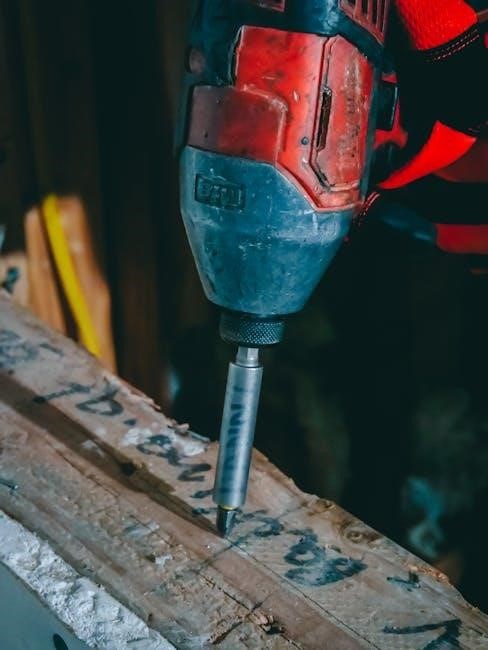
Types of Machine Screws
Machine screws come in diverse types, including hex head, Phillips head, flat head, and socket head. Each type offers unique features and applications, ensuring versatility in engineering solutions.
4.1 Hex Head Machine Screws
Hex head machine screws feature a hexagonal head, providing a large driving area for easy tightening. They are commonly used in construction, automotive, and heavy machinery. Made from materials like steel, stainless steel, or brass, they offer durability and corrosion resistance. Their coarse threads provide strong hold in materials like wood or metal. Ideal for applications requiring high torque, hex head screws are a popular choice for their reliability and ease of use. Available in various sizes, they suit both industrial and DIY projects effectively.
4.2 Phillips Head Machine Screws
Phillips head machine screws feature a cross-shaped slot, designed to prevent screwdriver slippage and reduce cam-out. This cruciform shape allows for better torque transmission, making them ideal for power tools. They are widely used in construction, electronics, and automotive industries due to their resistance to corrosion and ease of installation. Available in materials like steel, stainless steel, and brass, they offer durability and versatility. Their sizes range from fine to coarse threads, catering to various applications. Phillips head screws are a popular choice for their reliability and ease of use in both professional and DIY projects.
4.3 Flat Head Machine Screws
Flat head machine screws feature a countersunk design, allowing them to sit flush with the material surface. This makes them ideal for applications where a smooth finish is required. They are commonly used in construction, furniture, and automotive industries. Available in various materials like steel, stainless steel, and brass, they offer durability and corrosion resistance. Their sizes range from small to large diameters, with coarse or fine threads. The flat head design provides a stable connection and is often used in structural applications where strength and stability are critical.
4.4 Socket Head Machine Screws
Socket head machine screws feature a cylindrical head with a recessed socket drive, enabling high torque and precise control. Their compact design makes them ideal for applications with limited space. Available in various materials like steel, stainless steel, and alloy steel, they offer durability and corrosion resistance. Commonly used in machinery, automotive, and aerospace industries, these screws provide a reliable connection. Their recessed socket prevents cam-out, ensuring secure tightening. Socket head screws are versatile and suitable for high-strength applications where precision and reliability are essential.
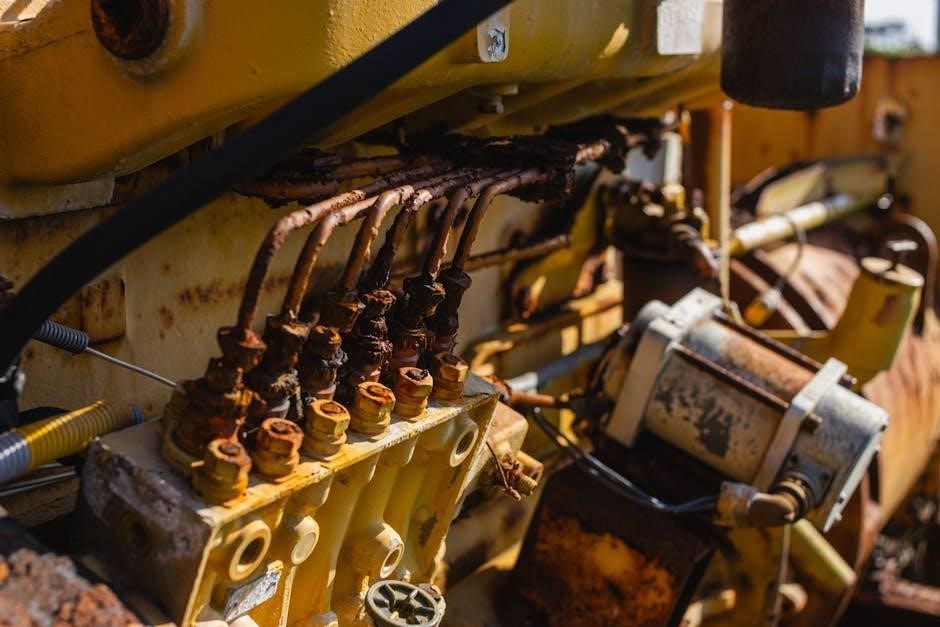
Applications of Machine Screws
Machine screws are integral to automotive, aerospace, and electronics industries, ensuring structural integrity and precision. Their versatility enables use in heavy machinery and miniature devices alike, meeting diverse engineering needs.
5.1 Automotive Industry: Engine and Chassis Applications
Machine screws are vital in automotive manufacturing, particularly in engine and chassis components. They ensure durability and stability under extreme conditions. High-strength steel screws are commonly used for critical connections, while corrosion-resistant coatings protect against environmental factors. Proper screw sizing is crucial to handle the stress and load in engines and chassis, ensuring safety and performance. Advanced materials and coatings further enhance their reliability in modern vehicles.
5.2 Aerospace Engineering: High-Strength and Precision Requirements
In aerospace engineering, machine screws must meet stringent high-strength and precision standards. They are used in critical applications like satellite components, aircraft engines, and navigation systems. Lightweight yet durable materials, such as titanium or high-strength stainless steel, are often selected to withstand extreme conditions. Precision sizing and torqueing ensure reliability in vibration-prone environments. These screws are essential for maintaining structural integrity and performance in aerospace systems, where failure is not an option. Their design and material selection are tailored to meet the unique demands of flight and space exploration.
5.3 Construction and Furniture: Structural Integrity and Design
Machine screws play a crucial role in construction and furniture, ensuring structural integrity and design durability. They are widely used in assembling frameworks, joining materials like wood and metal, and securing heavy loads. In furniture, they provide stability and longevity, especially in load-bearing pieces. The choice of screw size and material is vital to prevent loosening over time. Coatings like galvanized or zinc-plated enhance corrosion resistance, making them ideal for both indoor and outdoor applications. Proper sizing ensures safety and aesthetic appeal in construction and furniture projects.
5.4 Electronics: Miniature Machine Screws for Precision Devices
Miniature machine screws are indispensable in electronics, enabling the assembly of precision devices like smartphones, laptops, and IoT gadgets. Their compact size and high thread counts ensure secure connections in tight spaces. Stainless steel and brass screws are commonly used for corrosion resistance and conductivity. They are crucial for mounting PCBs, connectors, and sensors, ensuring reliability and durability. Customized sizes and coatings further enhance their performance in demanding electronic environments, making them vital for modern technology advancements.
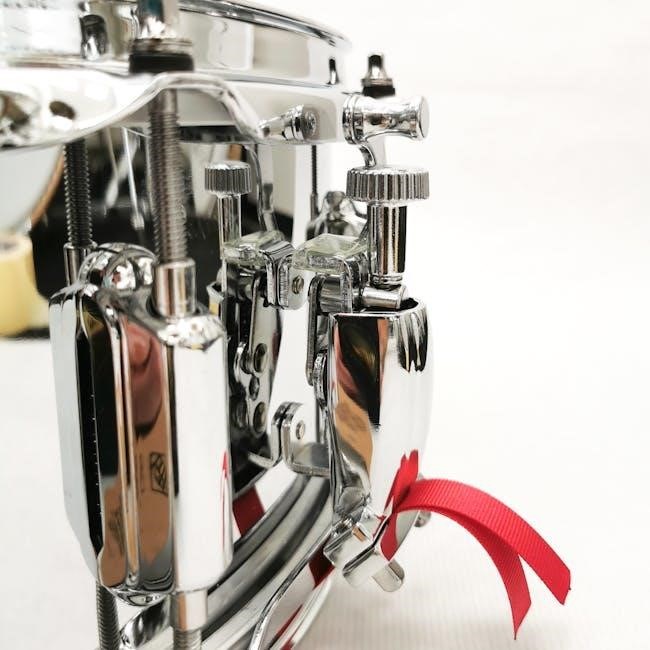
How to Choose the Right Machine Screw
Selecting the right machine screw involves assessing load requirements, environmental factors, and size compatibility. Matching material properties and budget ensures optimal performance and durability for specific applications.
6.1 Assessing Load and Stress Requirements
When selecting machine screws, evaluating the load and stress they will endure is crucial. Understanding the maximum weight and tension the screw must support ensures proper functionality. Environmental factors like temperature and humidity can also impact screw performance. Material strength and thread quality must align with these demands to prevent failure. Additionally, considering the screw’s ability to withstand shear and torsion forces ensures long-term reliability in the application. Proper assessment guarantees the screw can handle the intended workload without compromising safety or durability.
6.2 Considering Environmental Factors
Environmental factors play a significant role in machine screw selection. Moisture, humidity, and exposure to corrosive substances can affect durability. High temperatures may require heat-resistant materials, while outdoor applications demand UV-stable coatings. Chemical exposure necessitates inert materials like stainless steel. Ensuring the screw material aligns with environmental conditions prevents corrosion and extends lifespan. Consulting with manufacturers or engineers can help tailor selections for specific environmental challenges, ensuring optimal performance and reliability in diverse settings.
6.3 Matching Screw Size to Application Needs
Matching screw size to application needs is critical for ensuring proper fit and functionality. Factors like diameter, thread pitch, and length must align with the specific requirements of the project. Incorrect sizing can lead to poor fit, reduced strength, or even structural failure. Using conversion charts and specialized tools helps determine the right screw dimensions. Consider the load-bearing capacity and material compatibility to avoid mismatches. Always refer to manufacturer guidelines or consult experts for precise sizing, ensuring reliability and safety in your applications.
6.4 Budget and Availability: Balancing Cost and Quality
Budget and availability are crucial factors in selecting machine screws. While cost-effective options are appealing, compromising on quality may lead to premature failure. Always compare prices from trusted suppliers to ensure value for money. Bulk purchasing can reduce costs, but prioritize material and size requirements. Availability must align with project timelines to avoid delays. Assess lead times and stock levels to maintain workflow efficiency. Balancing cost and quality ensures long-term reliability and minimizes unexpected expenses, making it essential for successful project outcomes.
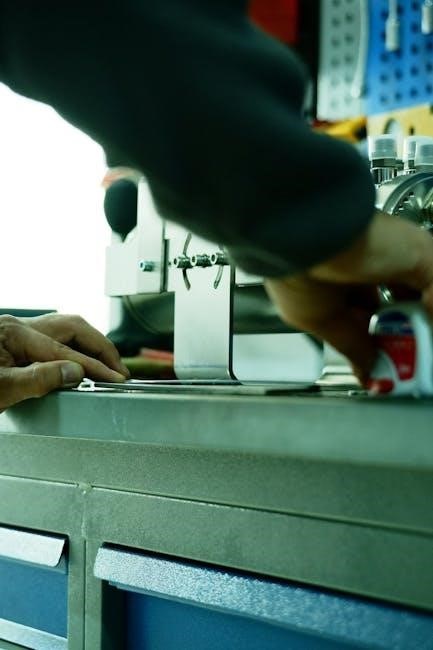
Installation and Tightening Guidelines
Proper installation ensures machine screws function optimally. Prepare surfaces to avoid contamination and ensure alignment. Use appropriate tools to tighten screws without over-tightening, preventing thread damage.
7.1 Preparing the Surface for Screw Installation
Proper surface preparation is crucial for machine screw installation. Clean the surface thoroughly using solvents to remove oil, grease, or debris. Inspect for cracks or unevenness and repair if necessary. Ensure the material is compatible with the screw material to prevent corrosion. Align the screw correctly with the hole to avoid misplacement. Use a guide or template if needed for precise alignment. Proper preparation ensures secure fastening, prevents stripped threads, and enhances durability. A well-prepared surface guarantees optimal screw performance and longevity.
7.2 Using the Correct Tools for Tightening
Selecting the right tools for tightening machine screws is essential for secure fastening. Use screwdrivers, Allen wrenches, or torque wrenches depending on the screw head type. Phillips, hex, or socket heads require matching tools for proper grip. Ensure tools are in good condition to avoid stripping screw heads. Apply steady, controlled force to prevent over-tightening. For precise applications, power tools with torque control are ideal. Always follow manufacturer guidelines for tool usage and torque specifications. Proper tools ensure efficient and damage-free installation, maintaining the integrity of the screw and material.
7.3 Avoiding Over-Tightening and Stripping Threads
Over-tightening machine screws can lead to stripped threads, weakening the joint. Use torque wrenches to apply the recommended force, preventing thread damage. Lubricate screws if necessary to reduce friction and avoid galling. Ensure the screw is properly seated before tightening. If resistance increases suddenly, stop to check alignment. Stripped threads can be repaired with thread inserts, but prevention is better. Always follow torque specifications and use the correct tools to maintain screw and material integrity, ensuring long-lasting connections.
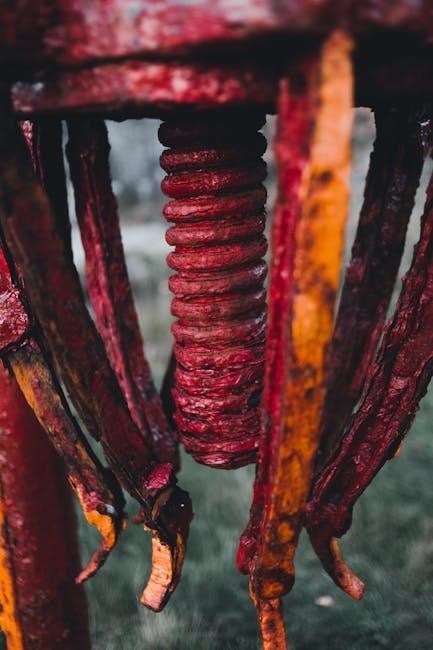
Maintenance and Replacement Tips
Regularly inspect machine screws for wear and corrosion. Lubricate threads to prevent friction and rust. Replace screws if damaged or loosened, ensuring safety and functionality in applications.
8.1 Inspecting Screws for Wear and Damage
Inspecting machine screws for wear and damage is crucial for maintaining structural integrity. Check for signs of corrosion, thread damage, or head wear. Use magnifying tools for detailed examination. Look for stripped threads, rust, or loosening, which can indicate stress or over-tightening. Replace screws with visible damage to prevent failures. Regular inspections ensure longevity and reliability in applications. Keep records of inspections for maintenance tracking and proactive replacements.
8.2 Lubrication to Prevent Corrosion and Friction
Lubrication is essential for preventing corrosion and reducing friction on machine screws. Apply silicone-based sprays or grease to threaded areas to protect against rust and wear. Regular lubrication ensures smooth operation and extends screw lifespan. Neglecting this step can lead to premature wear, thread damage, and loosening over time. Use compatible lubricants for the material and environment to avoid chemical reactions. Proper lubrication maintains structural integrity and reduces maintenance needs, ensuring reliable performance in critical applications.
8.3 When and How to Replace Machine Screws
Replace machine screws when signs of wear, corrosion, or damage are evident. Inspect for stripped threads, rust, or loose fittings. Use a torque wrench for removal to avoid further damage. When installing new screws, ensure they match the original size and material. Apply lubricant to reduce friction and prevent corrosion. Tighten gradually, following manufacturer guidelines, to avoid over-tightening. Regular replacement prevents system failure and ensures safety. Always use compatible tools and follow proper procedures to maintain structural integrity and performance efficiency.

Common Mistakes to Avoid
Common mistakes include incorrect screw size selection, material incompatibility, and over-tightening, which can lead to stripped threads or material damage. Always verify specifications before installation.
9.1 Incorrect Screw Size Selection
Incorrect screw size selection is a common mistake that can lead to poor fitment, reduced structural integrity, and potential failure; Always measure screw threads accurately and consult size guides to ensure compatibility. Using screws that are too small or too large for the application can result in inadequate holding power or damage to materials. Proper sizing ensures optimal performance and longevity. Refer to thread charts and measurement tools to avoid this error, as it directly impacts the reliability and safety of the assembly. Attention to detail is crucial in selecting the right screw size for any project.
9.2 Overlooking Material Compatibility
Overlooking material compatibility is a critical error that can lead to corrosion, mechanical failure, or improper fitment. Always ensure the screw material matches the environment and application. For example, stainless steel is ideal for corrosive conditions, while brass is better for electrical applications. Ignoring material compatibility can result in premature wear, rust, or electrical issues. Consult material compatibility charts and consider environmental factors like humidity or exposure to chemicals. Proper material selection ensures durability and functionality, preventing costly repairs or replacements down the line.
9.3 Improper Tightening Techniques
Improper tightening techniques can lead to stripped threads, damaged screw heads, or loose connections. Over-tightening may cause material deformation, while under-tightening risks mechanical failure. Always use the correct tools, such as wrenches or screwdrivers, and apply the recommended torque. Exceeding manufacturer guidelines can compromise the screw’s integrity. Proper tightening ensures a secure fit without causing permanent damage. Adhering to specified torque values and using calibrated tools helps prevent these issues, ensuring long-term reliability and safety in applications. Proper technique is as crucial as selecting the right screw size and material.
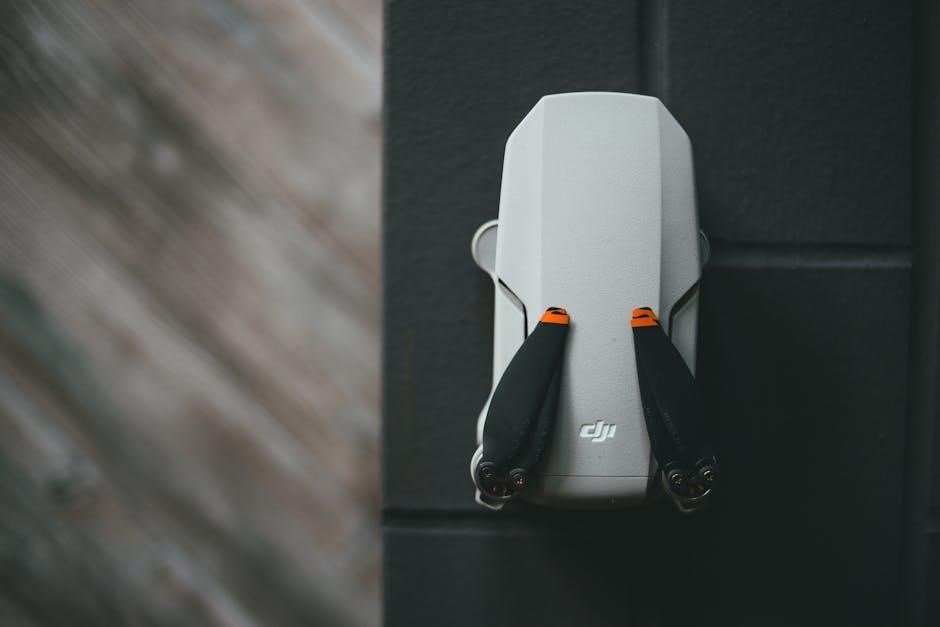
Future Trends in Machine Screw Technology
Future trends include advanced materials, smart screws with sensors for real-time monitoring, and 3D printing for custom manufacturing, enhancing precision and efficiency in industrial applications.
10.1 Advanced Materials and Coatings
Advancements in materials and coatings are revolutionizing machine screw technology. High-performance alloys like titanium and carbon fiber-reinforced polymers are being explored for enhanced strength-to-weight ratios. Additionally, innovative coatings such as titanium nitride and zinc flake are improving corrosion resistance and durability. These developments aim to meet the demanding requirements of industries like aerospace and automotive, where extreme conditions and longevity are critical. Such innovations not only extend the lifespan of machine screws but also enable their use in previously challenging environments, driving progress in modern engineering applications.
10.2 Smart Screws with Integrated Sensors
Smart screws with integrated sensors represent a cutting-edge innovation in fastening technology. These screws are equipped with embedded sensors that monitor factors like stress, temperature, and vibration, providing real-time data on their condition and the integrity of the assembly. Made from lightweight, durable materials, they are ideal for advanced applications in aerospace and automotive industries. By enabling predictive maintenance and reducing unexpected failures, smart screws enhance reliability and safety in critical systems, paving the way for smarter, more connected engineering solutions in the future.
10.3 3D Printing and Custom Screw Manufacturing
3D printing is revolutionizing custom screw manufacturing by enabling rapid production of complex designs. This technology allows for precise customization, creating screws with specific dimensions, thread patterns, and materials tailored to unique applications. It reduces prototyping time and minimizes material waste, making it ideal for specialized industries. With 3D printing, manufacturers can produce small batches or one-off screws efficiently, addressing niche demands. This innovation is driving the future of fastener production, offering unparalleled flexibility and precision for modern engineering challenges.